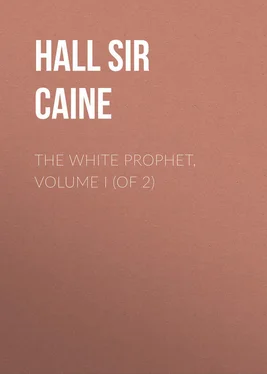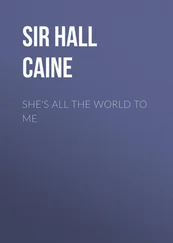Hall Caine - The White Prophet, Volume I (of 2)
Здесь есть возможность читать онлайн «Hall Caine - The White Prophet, Volume I (of 2)» — ознакомительный отрывок электронной книги совершенно бесплатно, а после прочтения отрывка купить полную версию. В некоторых случаях можно слушать аудио, скачать через торрент в формате fb2 и присутствует краткое содержание. Жанр: foreign_antique, foreign_prose, на английском языке. Описание произведения, (предисловие) а так же отзывы посетителей доступны на портале библиотеки ЛибКат.
- Название:The White Prophet, Volume I (of 2)
- Автор:
- Жанр:
- Год:неизвестен
- ISBN:нет данных
- Рейтинг книги:5 / 5. Голосов: 1
-
Избранное:Добавить в избранное
- Отзывы:
-
Ваша оценка:
- 100
- 1
- 2
- 3
- 4
- 5
The White Prophet, Volume I (of 2): краткое содержание, описание и аннотация
Предлагаем к чтению аннотацию, описание, краткое содержание или предисловие (зависит от того, что написал сам автор книги «The White Prophet, Volume I (of 2)»). Если вы не нашли необходимую информацию о книге — напишите в комментариях, мы постараемся отыскать её.
The White Prophet, Volume I (of 2) — читать онлайн ознакомительный отрывок
Ниже представлен текст книги, разбитый по страницам. Система сохранения места последней прочитанной страницы, позволяет с удобством читать онлайн бесплатно книгу «The White Prophet, Volume I (of 2)», без необходимости каждый раз заново искать на чём Вы остановились. Поставьте закладку, и сможете в любой момент перейти на страницу, на которой закончили чтение.
Интервал:
Закладка:
"Ishmael Ameer thinks Islam should advance with advancing progress."
"There again we are with you, O Sheikh – we have people of the same kind in Christianity."
"Ishmael Ameer thinks slavery, the seclusion of women, divorce, and polygamy are as much opposed to the teaching of Mohammed as to the progress of society."
"Excellent! My father says the same thing. Wallahi ! (I assure you!) Or rather, he holds that Islam can never take its place as the religion of great progressive nations until it rids itself of these evils."
"Ishmael Ameer thinks the corruptions of Islam are the work of the partisans of the old barbaric ideas, who are associating the cause of religion with their own interests and passions."
"Splendid! Do you know the Consul-General is always saying that, sir?"
"Ishmael Ameer believes that if God wills it (praise be to Him, the Exalted One!) the day is not distant when an appeal to the Prophet's own words will regenerate Islam, and banish the Caliphs and Sultans whose selfishness and sensuality keep it in bondage to the powers of darkness."
"Really," said Gordon, rising impetuously to his feet, "if Ishmael Ameer says this, he is the man Egypt, India, the whole Mohammedan world, is waiting for. No wonder men like the Cadi are trying to destroy him, though that's only an instinct of self-preservation – but my father, the Consul-General … What is there in all this to create … Why should such teaching set Moslem against Christian?"
"Ishmael Ameer, O my brother," the Chancellor continued with the same soft voice, "thinks Islam is not the only faith that has departed from the spirit of its founder."
"True!"
"If Islam for its handmaidens has divorce and polygamy, Christianity has drunkenness and prostitution."
"No doubt – certainly."
"Coming out of the East, out of the desert, Ishmael Ameer sees in the Christianity of the West a contradiction of every principle for which your great Master fought and suffered."
Gordon sat down again.
"His was a religion of peace, but while your Christian Church prays for unity and concord among the nations your Christian States are daily increasing the instruments of destruction. His was a religion of poverty, but while your Christian priests are saying 'Blessed are the meek,' your Christian communities are struggling for wealth and trampling upon the poor in their efforts to gain it. Ishmael Ameer believes that if your great Master came back now He would not recognise in the civilisation known by His name the true posterity of the little church He founded on the shores of the Lake of Galilee."
"All this is true, too true," said Gordon, "yet under all that … Doesn't Ishmael Ameer see that under all that – "
"Ishmael Ameer sees," said the Chancellor, "that what is known to the world as Christian civilisation is little better than an organised hypocrisy, a lust of empire in nations and a greed of gold in men, destroying liberty, morality, and truth. Therefore he warns his followers against a civilisation which comes to the East with religion in one hand and violence and avarice in the other."
"But surely he sees," said Gordon, "what Christian civilisation has done for the world, what science has done for progress; what England, for example, has done for Egypt?"
"Ishmael Ameer thinks," replied the Chancellor in the same slow, soft voice, "that the essential qualities of national greatness are moral, not material; that man does not live by bread alone; that it is of little value to Egypt that her barns are full if the hearts of her children are empty; that Egypt can afford to be patient, for she is old and eternal; that many are the events which have passed before the eyes of the crouching Sphinx; that the life of man is threescore and ten years, but when Egypt reviews her past she looks back on threescore and ten centuries."
There was silence for a moment, during which the muezzin's voice was heard again, calling the first hour of night, and then Gordon, visibly agitated, said —
"You think Ishmael Ameer a regenerator, a reformer, a redeemer of Islam; and if his preaching prevailed it would send the Grand Cadi back to his Sultan – isn't that so?" But the Chancellor made no reply.
"It would also send England out of Egypt – wouldn't it?" said Gordon, but still the Chancellor gave no sign.
"It would go farther than that perhaps – it would drive Western civilisation out of the East – wouldn't that be the end of it?" said Gordon, and then the Chancellor replied —
"It would drive a corrupt and ungodly civilisation out of the world, my son."
"I see!" said Gordon. "You think the mission of Ishmael Ameer transcends Egypt, transcends even Europe, and says to humanity in general, 'What you call civilisation is killing religion, because the nations – Christian and Moslem alike – have sold themselves to the lust of empire and the greed of gold' – isn't that what you mean?"
The Chancellor bowed his grave head, and in a scarcely audible voice said, "Yes."
"You think, too," said Gordon, whose breathing was now quick and loud, "that Ishmael Ameer is an apostle of the soul of Islam – perhaps of the soul of religion itself without respect of creed – one of the great men who come once in a hundred years to call the world back from a squalid and sordid materialism, and are ready to live, aye, and to die for their faith – the Savonarolas, the Luthers, the Gamal-ed-Deens – perhaps the Mohammeds and" (dropping his voice) "in a sense the Christs?"
But the Egyptian soul, like the mirage of the Egyptian desert, recedes as it is approached, and again the Chancellor made no reply.
"Tell me, O Sheikh," said Gordon, rising to go, "if Ishmael Ameer came to Cairo, would you permit him to preach in El Azhar?"
"He is an Alim" (a doctor of the Koran); "I could not prevent him."
"But would you lodge him in your own house?"
"Yes."
"That is enough for me. Now I must go to Alexandria and see him for myself."
"May God guide you, O my son," said the Chancellor, and a moment afterwards his soft voice was saying farewell to the two young soldiers at the door.
"Let us walk back to barracks, Hafiz," said Gordon. "My head aches a little, somehow."
CHAPTER VIII
It was night by this time; the courts and corridors of El Azhar were empty, and even the tangled streets outside were less loud than before with the guttural cries of a swarming population, but a rumbling murmur came from the mosque of the University, and the young soldiers stood a moment at the door to look in. There, under a multitude of tiny lanterns, stood long rows of men in stockinged feet and Eastern costume, rising and kneeling in unison, at one moment erect and at the next with foreheads to the floor, while the voice of the Imam echoed in the arches of the mosque and the voices of the people answered him.
Then through narrow alleys, full of life, lit only by the faint gleam of uncovered candles, with native women, black-robed and veiled, passing like shadows through a moving crowd of men, the young soldiers came to the quarter of Cairo that is nick-named the "Fish Market," where the streets are brilliantly lighted up, where the names over the shops are English and French, Greek, and Italian, and where girls with painted faces wave their hands from barred windows and call to men who sit at tables in front of the cafés opposite, drinking wine, smoking cigarettes, and playing dominoes. The sound of music and dancing came from the open windows behind the girls who glittered with gold brocade and diamonds; and among the men were young Egyptians in the tarboosh and British soldiers in khaki, who looked across at the women in the flare of the coarse light and laughed.
At the gate of the Kasr-el-Nil barracks the young men parted.
Читать дальшеИнтервал:
Закладка:
Похожие книги на «The White Prophet, Volume I (of 2)»
Представляем Вашему вниманию похожие книги на «The White Prophet, Volume I (of 2)» списком для выбора. Мы отобрали схожую по названию и смыслу литературу в надежде предоставить читателям больше вариантов отыскать новые, интересные, ещё непрочитанные произведения.
Обсуждение, отзывы о книге «The White Prophet, Volume I (of 2)» и просто собственные мнения читателей. Оставьте ваши комментарии, напишите, что Вы думаете о произведении, его смысле или главных героях. Укажите что конкретно понравилось, а что нет, и почему Вы так считаете.












